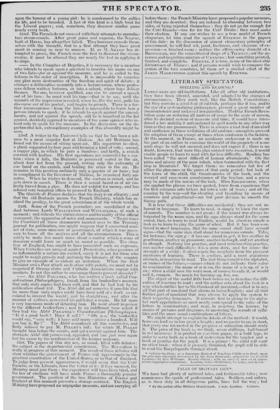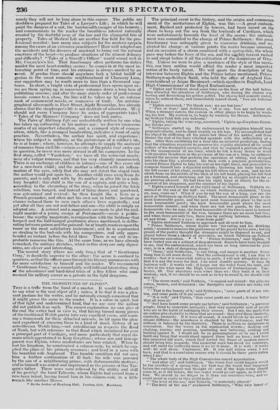TALES OF MiLlTARY
WE have had plenty of national tales, and fashionable tales ; now commences the epoch of professional tales. Soldiers and sailors, as is their duty in all dangerous paths, have led the way ; but J3y the author orthe Military Sketch-book. 3 vols. Loudon. Colburn. surely they will not be long alone in this career. The public are doubtless prepared for Tales of a Lawyer's Life ; in which he will paint the dangers of a suit, the hairbreadth escapes of his honesty ; and communicate to the reader the breathless interest naturally created by the doubtful issue of the law and the changeful fate of property. Tales of Medical Life are another fine field for the pro- fessional novelist : how many nice subjects for the modern epopeia among the cases of an extensive practitioner ! How well adapted are the accidents and the diseases of mankind to bring out the natural emotions of the heart—to produce situations of the utmost delicacy and difficulty "Tales of a Sherifrs Officer" would sound well in Mr. COLBURN'S list. That functionary often performs his duties amidst the most heart-rending scenes : he comes in at the most in- teresting point of time, and his entrance is always marked by an event. If perdue there shoukl anywhere lurk a latitat bailiff of genius in the sweet romantic neighbourhood of Chancery Lane, our suggestion may be worth more to him than a thousand cap- tures. In short, a bright vista of professional lives opens upon us : we see them spring up in successive volumes down a long lane of publishing seasons ; and after the more stately order of professional novels comes to a close, the line will be taken up by an inferior rank of commercial novels, or romances of trade. An autobio- graphical silversmith in Fleet Street, /tight Brassridge, has already shown that the shopkeeper's life is not destitute of adventure. Wily should not every Company have its series of appropriate tales ? "Tales of the Skinners' Company" does not look amiss.
The Tales qf Military Life are undoubtedly written by one who has taken up authorship in his mature age : we discern numerous marks of an imperfect education, and a cramped style of compo- sition, which, like a cramped handwriting, indicates a want of early practice. Nevertheless, the author has spirit, and experience : where his subject is military, or the picturesque of a soldier's life, he is at:home ; where, however, he attempts to supply the materiel of romance from civil life—where events of the plain coat order are in question, he never was more abroad in all his campaigns. In the first story, called " Vandeleur," we have all the worn-out machi- nery of a vulgar romance, and that too very clumsily manceuvred. There is an exchange of children in infancy—one of five years old for a new-born child ; and the mother is affected with an inflam- mation of the eyes, solely that she may not detect the stupid trick the author would put upon her. Another child runs away from its parents, and is only met with by its mother in after life in a mili- tary hospital : this child is the son of a captaip, and quite a boy, according to the chronology of the story, when he joined the Irish rebellion, was hanged, and instead of being drawn and quartered, was galvanized and revived : he then fought like a hero as a French grenadier, and often met his own son in battle : instinct or chance induced them to save each other's lives repeatedly; and yet after all they are not real father and son—the child is simply an adopted one. A colonel and a magistrate are made to plot the mid- night murder of a young ensign at Portsmouth—scene a public- house : the worthy magistrate, in Conjunction with the beldame that keeps it and the half-hanged gentleman above mentioned, is delibe- rating between poison and the poniard: he at length resolves upon the razor as the most satisfactory instrument; and he is represented as stealing to the bed-side with his companions, and only appre- hended an instant before the fatal blow. There is no end to im- probable nonsense like this. At the same time, as we have already remarked, the military sketches, which in this story are only digres- sions, are clever and interesting. The second story (there are only two,) that of " Gentleman Gray," is decidedly superior to the other : the scene is confined to quarters, so that the officer goes through his literary manceuvres with far more satisfaction to himself and the reader. We recommend " Gentleman Gray," as a remarkably well-told and interesting story of the adventures and hard-fated trials of a fine fellow who com- menced his military career as a private in the light dragoons.



















 Previous page
Previous page